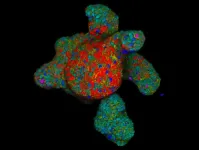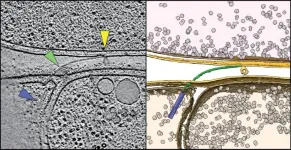(Press-News.org) A new study shows that an artificial intelligence (AI) tool can help people with different views find common ground by more effectively summarizing the collective opinion of the group than humans. By producing statements that convey the majority opinion, while incorporating the minority’s perspective, the AI produced outputs that participants preferred—and that they rated as more informative, clear, and unbiased, compared to those written by human mediators. Human society is enriched by a plurality of viewpoints, but agreement is a prerequisite for people to act collectively. Finding agreement through a free exchange of views is often difficult. Collective deliberation can be slow, difficult to scale, and not equally attentive to different voices. Inspired by recent demonstrations that showed that large language models (LLMs) can effectively summarize varying perspectives on a public debate platform, Michael Tessler and Michiel Bakker of Google DeepMind, and colleagues, explored whether an AI mediator could support the process of deliberation, helping people who disagree feel less divided, feel their viewpoint was heard, and find common ground.
In their United Kingdom-based study – involving several thousand people found on a crowdsourcing research platform – the authors asked human participants to write their opinions on complex and important topics. In an iterative process, participants, who were organized into small groups, submitted their personal opinions to an LLM that had been trained to generate a “group statement” – one focused on elevating shared viewpoints. Group statements were also written by human mediators. Participants could review both AI- and human-generated group statements and consider whether the statements aligned with their own views. The AI mediator’s statements were preferred by participants 56% of the time vs. 44% for the human mediators’ statements. After deliberating with the AI mediator, the small groups of participants were less divided in their positions on the issues, suggesting that meaningful common ground was found. The authors report the AI-generated statements were successful because they incorporated dissenting voices while respecting the majority position. The authors replicated their results in a real-world sample of UK participants that more closely reflected the diversity in the UK population, finding AI statements were highly endorsed and left groups less divided. “… the key translational opportunity provided [by this AI tool] …is that it facilitates collective deliberation that is time-efficient, fair and scalable,” say the authors. Their new approach to collective deliberation circumvents some of the limitations of in-person debate, they say, while also noting it may miss out on other advantages that arise from in-person discussion, including the opportunity to build interpersonal relationships with other discussants.
END
AI-assisted deliberation can help people with different views find common ground
Summary author: Meagan Phelan
2024-10-17
ELSE PRESS RELEASES FROM THIS DATE:
Special Issue explores factors influencing democratic attitudes, and what’s at stake for science in the U.S. after November election
2024-10-17
The health of American democracy is facing challenges, with experts pointing to recent democratic backsliding, deepening partisan divisions, and growing anti-democratic attitudes and rhetoric. In this issue of Science, Research Articles, a Policy Forum, a Science News feature, and a related Editorial highlight how the tools of science and technology are being used to address this growing concern and how the upcoming U.S. presidential election could impact U.S. science.
In one research study in this special issue, Jonathan Chu and colleagues sought to understand whether understandings ...
Extratropical forest fire emissions are increasing as climate changes
2024-10-17
As climate change promotes fire-favorable weather, climate-driven wildfires in extratropical forests have overtaken tropical forests as the leading source of global fire emissions, researchers report. The findings raise urgent concerns about the future of forest carbon sinks under climate change. Fire has long played a role in shaping Earth's forests and regulating carbon storage in ecosystems. However, anthropogenic climate change has intensified fire-prone weather, leading to an increase in burned areas and carbon emissions, particularly in forested regions. These fires not only reduce forests' ability to absorb carbon but also disrupt ecosystems, harm biodiversity, and pose significant ...
A new approach to capturing complex mixtures of organic chemicals in blood, evaluated in pregnant women
2024-10-17
Studies of chemicals in our blood typically capture only a small and unknown fraction of the entire chemical universe. Now, a new approach aims to change that. In a study involving blood samples of pregnant women collected between 2006 and 2008, researchers report having quantified many complex mixtures of chemicals that may pose neurotoxic risks, even when the individual chemicals were present at seemingly harmless levels. “The quantification of 294 to 473 chemicals in plasma is a major improvement compared with the usual targeted analysis focusing on only few selective analytes,” wrote the authors. ...
Gut instincts: Intestinal nutrient sensors
2024-10-17
A multi-institutional group of researchers led by the Hubrecht Institute and Roche’s Institute of Human Biology has developed strategies to identify regulators of intestinal hormone secretion. In response to incoming food, these hormones are secreted by rare hormone producing cells in the gut and play key roles in managing digestion and appetite. The team has developed new tools to identify potential ‘nutrient sensors’ on these hormone producing cells and study their function. This could result in new strategies to interfere with the release of these hormones and provide avenues for the treatment of a variety of metabolic or gut motility disorders. The work will be presented ...
Catching prey with grappling hooks and cannons
2024-10-17
Countless bacteria call the vastness of the oceans home, and they all face the same problem: the nutrients they need to grow and multiply are scarce and unevenly distributed in the waters around them. In some spots they are present in abundance, but in many places they are sorely lacking. This has led a few bacteria to develop into efficient hunters to tap into new sources of sustenance in the form of other microorganisms.
Although this strategy is very successful, researchers have so far found only a few predatory bacterial species. One is the soil bacterium Myxococcus xanthus; ...
Effects of chemical mixtures: Neurotoxic effects add up
2024-10-17
"In our everyday lives, we are exposed to a wide variety of chemicals that are distributed and accumulate in our bodies. These are highly complex mixtures that can affect bodily functions and our health," says Prof Beate Escher, Head of the UFZ Department of Cell Toxicology and Professor at the University of Tübingen. "It is known from environmental and water studies that the effects of chemicals add up when they occur in low concentrations in complex mixtures. Whether this is also the case in the human body has not yet been sufficiently investigated - this is precisely where our study comes in."
The extensive research work was based on over 600 blood samples from ...
Mpox in Africa was neglected during the previous outbreak, and requires urgent action and investment by leaders now to prevent global spread
2024-10-17
Mpox in Africa was neglected during the previous outbreak, and requires urgent action and investment by leaders now to prevent global spread, claim experts from The Independent Panel for Pandemic Preparedness and Response, ex-NZ Prime Minister Helen Clark, former Liberian President and Nobel Peace Prize winner Ellen Johnson Sirleaf, and other global health specialists.
####
Article URL: https://journals.plos.org/globalpublichealth/article?id=10.1371/journal.pgph.0003714
Article Title: Mpox: Neglect has led to a more dangerous virus now spreading across borders, harming and killing people. Leaders must take action to stop mpox now
Author Countries: ...
A new era of treating neurological diseases at the blood-brain-immune interface
2024-10-17
SAN FRANCISCO—The question of what causes complex neurological diseases such as Alzheimer’s or multiple sclerosis continues to confound scientists and doctors, with the unknowns standing in the way of early diagnoses and effective treatments.
Even among identical twins who share the same genetic risk factors, one may develop a particular neurological disease while the other does not.
That’s because unlike diseases such as cystic fibrosis or sickle-cell anemia, which are caused by a single gene, most neurological disorders are associated with many—sometimes hundreds—of rare genetic variants. ...
Astronomers detect ancient lonely quasars with murky origins
2024-10-17
A quasar is the extremely bright core of a galaxy that hosts an active supermassive black hole at its center. As the black hole draws in surrounding gas and dust, it blasts out an enormous amount of energy, making quasars some of the brightest objects in the universe. Quasars have been observed as early as a few hundred million years after the Big Bang, and it’s been a mystery as to how these objects could have grown so bright and massive in such a short amount of cosmic time.
Scientists have proposed that the earliest quasars sprang from overly dense ...
New study highlights the dangers of handheld cellphone use among teen drivers
2024-10-17
PHILADELPHIA (October 17, 2024) – A new study, conducted by a group of researchers led by Penn Nursing and Perelman School of Medicine and funded by the Centers for Disease Control, found a strong association between handheld cellphone use and risky driving behaviors among newly licensed teen drivers. The study, published online first in JAMA Open, used a smartphone telematics application to track the driving habits of hundreds of teens and identify potential safety risks.
The investigation found that teens who used their cellphones while driving were significantly more likely to engage in risky driving behaviors, such as hard braking and rapid acceleration. These behaviors can ...
LAST 30 PRESS RELEASES:
Why conversation is more like a dance than an exchange of words
With Evo 2, AI can model and design the genetic code for all domains of life
Discovery of why only some early tumors survive could help catch and treat cancer at very earliest stages
Study reveals how gut bacteria and diet can reprogram fat to burn more energy
Mayo Clinic researchers link Parkinson's-related protein to faster Alzheimer's progression in women
Trends in metabolic and bariatric surgery use during the GLP-1 receptor agonist era
Loneliness, anxiety symptoms, depressive symptoms, and suicidal ideation in the all of us dataset
A decision-support system to personalize antidepressant treatment in major depressive disorder
Thunderstorms don’t just appear out of thin air - scientists' key finding to improve forecasting
Automated CT scan analysis could fast-track clinical assessments
New UNC Charlotte study reveals how just three molecules can launch gene-silencing condensates, organizing the epigenome and controlling stem cell differentiation
Oldest known bony fish fossils uncover early vertebrate evolution
High‑performance all‑solid‑state magnesium-air rechargeable battery enabled by metal-free nanoporous graphene
Improving data science education using interest‑matched examples and hands‑on data exercises
Sparkling water helps keep minds sharp during long esports sessions
Drone LiDAR surveys of abandoned roads reveal long-term debris supply driving debris-flow hazards
UGA Bioinformatics doctoral student selected for AIBS and SURA public policy fellowship
Gut microbiome connected with heart disease precursor
Nitrous oxide, a product of fertilizer use, may harm some soil bacteria
FAU lands $4.5M US Air Force T-1A Jayhawk flight simulator
SimTac: A physics-based simulator for vision-based tactile sensing with biomorphic structures
Preparing students to deal with ‘reality shock’ in the workplace
Researchers develop beating, 3D-printed heart model for surgical practice
Black soldier fly larvae show promise for safe organic waste removal
People with COPD commonly misuse medications
How periodontitis-linked bacteria accelerate osteoporosis-like bone loss through the gut
Understanding how cells take up and use isolated ‘powerhouses’ to restore energy function
Ten-point plan to deliver climate education unveiled by experts
Team led by UC San Diego researchers selected for prestigious global cancer prize
Study: Reported crop yield gains from breeding may be overstated
[Press-News.org] AI-assisted deliberation can help people with different views find common groundSummary author: Meagan Phelan





